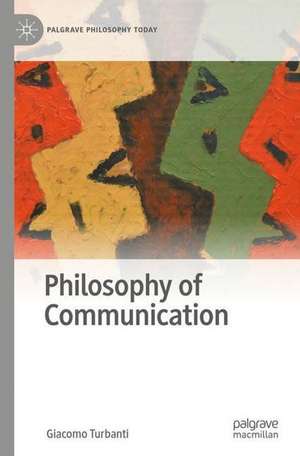Philosophy of Communication: Palgrave Philosophy Today
Autor Giacomo Turbantien Limba Engleză Paperback – 28 ian 2023
Key Features:
- Arranged in three parts encompassing the theory of communication, conflict transformation and the role communication plays within organizations. Examines how agreement is reached through communication, how such agreement is negotiated between different perspectives and how such negotiation produces our organizations.
- Includes a full range of pedagogical features, including study questions, essay questions. chapter summaries, focus points and suggestions for further reading.
Philosophy of Communication is essential reading for all students of the philosophy of communication.
Preț: 372.15 lei
Nou
Puncte Express: 558
Preț estimativ în valută:
71.22€ • 74.16$ • 60.19£
71.22€ • 74.16$ • 60.19£
Carte disponibilă
Livrare economică 18 februarie-04 martie
Livrare express 01-07 februarie pentru 38.15 lei
Preluare comenzi: 021 569.72.76
Specificații
ISBN-13: 9783031124624
ISBN-10: 3031124626
Pagini: 349
Ilustrații: XXI, 349 p. 58 illus.
Dimensiuni: 155 x 235 x 25 mm
Greutate: 0.52 kg
Ediția:1st ed. 2022
Editura: Springer International Publishing
Colecția Palgrave Macmillan
Seria Palgrave Philosophy Today
Locul publicării:Cham, Switzerland
ISBN-10: 3031124626
Pagini: 349
Ilustrații: XXI, 349 p. 58 illus.
Dimensiuni: 155 x 235 x 25 mm
Greutate: 0.52 kg
Ediția:1st ed. 2022
Editura: Springer International Publishing
Colecția Palgrave Macmillan
Seria Palgrave Philosophy Today
Locul publicării:Cham, Switzerland
Cuprins
Part I. Towards a cognitive theory of communication.- Chapter 1. The phenomenon of human communication.- Chapter 2. The semiotic approach.- Chapter 3. Syntactic, semantic and pragmatic rules.- Chapter 4. The limits of the code model.- Chapter 5. Grice’s inferential model.- Chapter 6. Levels of meaning.- Chapter 7. Relevance Theory.- Part II. The role of communication in conflict transformation.- Chapter 8. What are conflicts and why do they occur?.- Chapter 9. Conflict analysis.- Chapter 10. Conflict dynamics.- Chapter 11. Conflict transformation.- Part III. The communicative constitution of organizations.- Chapter 12. Organizations and communication.- Chapter 13. Classical theories of organizations.- Chapter 14. Systems theory.- Chapter 15. Sensemaking.- Chapter 16. Emergent organizations.- Chapter 17. Objectivity.- Chapter 18. Normativity.
Notă biografică
Giacomo Turbanti is Research Fellow in the Department of Civilizations and Forms of Knowledge, University of Pisa, Italy.
Textul de pe ultima copertă
By comprehensively exploring the theoretical questions raised by professional communication, this book provides an introduction to the philosophy of communication.
Key Features:
Philosophy of Communication is essential reading for all students of the philosophy of communication.
Giacomo Turbanti is Research Fellow in the Department of Civilizations and Forms of Knowledge, University of Pisa,Italy
Key Features:
- Arranged in three parts encompassing the theory of communication, conflict transformation and the role communication plays within organizations.
- Examines how agreement is reached through communication, how such agreement is negotiated between different perspectives and how such negotiation produces our organizations.
- Includes a full range of pedagogical features, including study questions, essay questions. chapter summaries, focus points and suggestions for further reading.
Philosophy of Communication is essential reading for all students of the philosophy of communication.
Giacomo Turbanti is Research Fellow in the Department of Civilizations and Forms of Knowledge, University of Pisa,Italy
Caracteristici
Provides a comprehensive introduction to the philosophy of communication Encompasses the theory of communication, conflict transformation and organizational theory Includes a wide range of pedagogical features















